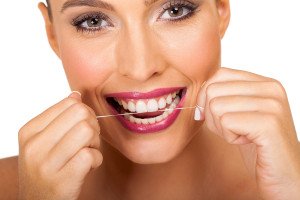Why Bother Flossing?
 Brushing your teeth is good enough as far as dental hygiene goes, isn’t it? You brush for a good couple minutes every session, after all, and you use a toothpaste with all the latest and greatest extras to make sure your teeth are nice and healthy. You even make sure to replace your toothbrush four times a year no matter what shape it’s in and you gargle with mouthwash every morning without fail. Sadly, though, there’s just no substitute for flossing.
Brushing your teeth is good enough as far as dental hygiene goes, isn’t it? You brush for a good couple minutes every session, after all, and you use a toothpaste with all the latest and greatest extras to make sure your teeth are nice and healthy. You even make sure to replace your toothbrush four times a year no matter what shape it’s in and you gargle with mouthwash every morning without fail. Sadly, though, there’s just no substitute for flossing.
Cleaning Every Nook And Cranny
One of the big secrets of dental hygiene is the fact that, even without any toothpaste, brushing your teeth goes a long way towards protecting them. The reason is quite simple: the brush is scraping away plaque, plaque which slowly eats away at your teeth and can eventually turn into tartar. Tartar is a mineral deposit and can’t be removed without the help of a trained dentist or dental hygienist, but with regular care, you can keep the plaque from getting that far (or at least from getting too bad).
However, plaque does not build up only on the front and back of your teeth. It also grows in the spaces between them, and no matter what chemicals you wash your mouth with, there’s no replacement for getting in there and scraping the plaque off directly.
A Painful Decision
There are a lot of excuses when it comes to flossing, excuses like “It takes too long,” and “Flossing hurts my gums.” However, excuses are all they are.
Worries about time management and coordination aren’t particularly relevant now that anyone can get bags full of disposable flossers at their local drug store. Regular floss is still out there for the purists, but flossing tools skip past certain issues like getting the floss wound tight around your fingers without necessarily cutting off your circulation.
As for the pain, it’s true enough that after the first time you floss, your gums will likely be sore, bleeding, and puffy, but the same thing happens if you skip brushing for a few months, too. Your gums are a particularly sensitive kind of tissue, and so it’s easy for it to start bleeding if it’s unprepared for a certain kind of stimulation. If they’re healthy, however, your gums will stop bleeding after about a week or two and after that there should be no real pain or discomfort involved in flossing.
For all the soaps and all the killer chemicals we’ve invented, there’s still no substitution for the ways we wipe and scrape our bodies clean to rid ourselves of all the dangerous dirt and bacteria out there. As such, no combination of alternatives can replace a good flossing.